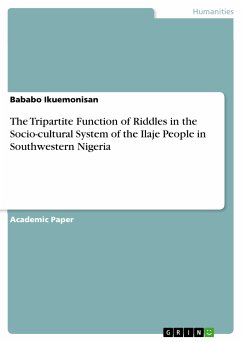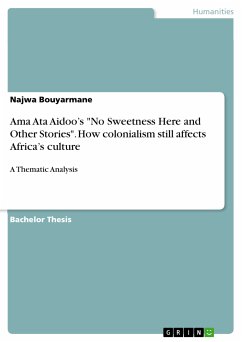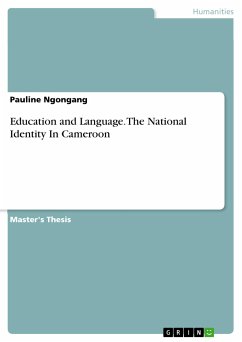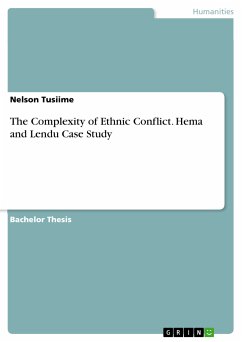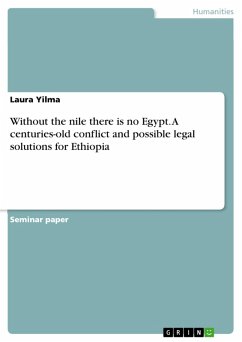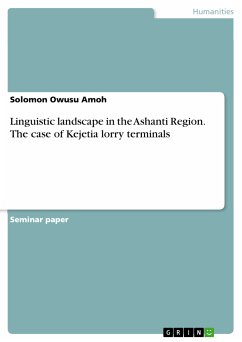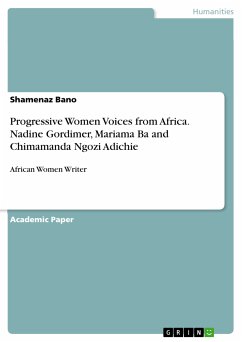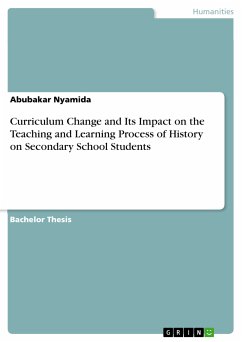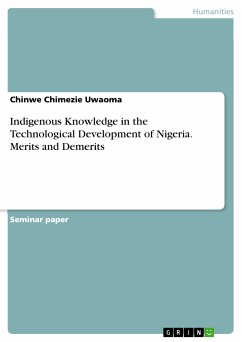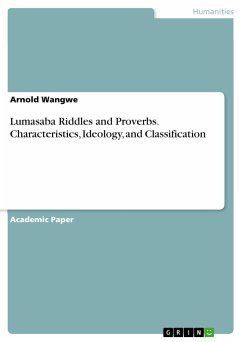
Lumasaba Riddles and Proverbs. Characteristics, Ideology, and Classification (eBook, PDF)
Sofort per Download lieferbar
Statt: 17,95 €**
13,99 €
inkl. MwSt. und vom Verlag festgesetzt.
**Preis der gedruckten Ausgabe (Broschiertes Buch)
Weitere Ausgaben:

PAYBACK Punkte
0 °P sammeln!
Academic Paper from the year 2019 in the subject African Studies - Linguistics, grade: A, Makerere University (Faculty of Arts), course: Literature, language: English, abstract: This paper examines the intricate characteristics of Lumasaba (a language spoken in eastern Uganda) riddles and proverbs. It argues that these literary trajectories are poetically related. Through these oral literature forms, the ideologies of the Bamasaba people are enhanced. By studying these verbal esoteric aphorisms, the riddles, which have been relegated as children's playthings are given literary significance. Ev...
Academic Paper from the year 2019 in the subject African Studies - Linguistics, grade: A, Makerere University (Faculty of Arts), course: Literature, language: English, abstract: This paper examines the intricate characteristics of Lumasaba (a language spoken in eastern Uganda) riddles and proverbs. It argues that these literary trajectories are poetically related. Through these oral literature forms, the ideologies of the Bamasaba people are enhanced. By studying these verbal esoteric aphorisms, the riddles, which have been relegated as children's playthings are given literary significance. Even the seemingly nosensical sound riddles project important messages to the reader, therefore worth of literary inquiry. The collection and interpretation of oral literature forms from predominantly orate societies is testimony to the notion that the libraries of society are fast passing away, and it is incumbent upon the young generation to document these verbal forms for posterity. In the discourse, an exegesis of the riddles and proverbs have been made to categorise them basing on literary features such as rhyme and rhythm, the symbolic elements, alliterations, metaphors, similies, onomatopoeiac expressions, parallelism, repetition, and rhetorical questions among other literary forms of expression. This interconnectedness points to the fluidity of oral texts to an extent that no single context is sufficient to explain their meanings. Sound riddles present a fascinating interpretation of the Bamasaba cosmology. They show that even untranslatable or nonsensical words give an insight into understanding the surrounding environment of the Bamasaba. Themes of life, ecological relationships and rain are pertinent aspects of Bamasaba's world contained in riddles. It is established that language permeates the epicenter of riddles and proverbs. Of the literary features that imbue them, symbolism stands out as the most important feature. What is peculiar about Lumasaba riddles and proverbs is that regardless of the categorization or structure, they possess a variety of meanings that bring out core ideologies of the Bamasaba. The classification of proverbs into literal, symbolic and philosophical categories enables us to decipher the riddle in the proverb; we look for what it signifies. Harlod Garfinkel's theory of ethnomethodology has been applied to make sense of Lumasaba riddles especially the tenet of the centrality of langauge that communicates the world views and the philosophy of life of the people. Riddles are conduits of Lumasaba cultural values intended to socialize children and adults alike into useful citizens of the community.
Dieser Download kann aus rechtlichen Gründen nur mit Rechnungsadresse in A, B, BG, CY, CZ, D, DK, EW, E, FIN, F, GR, HR, H, IRL, I, LT, L, LR, M, NL, PL, P, R, S, SLO, SK ausgeliefert werden.




